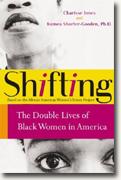Charisse Jones & Kumea Shorter-Gooden
book reviews:
· general fiction
· chick lit/romance
· sci-fi/fantasy
· graphic novels
· nonfiction
· audio books
· author interviews
· children's books @
curledupkids.com
· DVD reviews @
curledupdvd.com
newsletter
win books
buy online
links
home
for authors
& publishers
for reviewers

 |
Shifting: The Double Lives of Black Women in America Charisse Jones and Kumea Shorter-Gooden HarperCollins Hardcover 352 pages September 2003 |
|
Shifting author Charisse Jones is a correspondent for USA Today, and co-author Kumea Shorter-Gooden is a psychologist. Both are successful, intelligent, proud, professional black women. They have taken on the task of telling us what's wrong with this picture.
"I think many of us have to be chameleons. We have to move in and out of our private lives, back into our corporate lives....and I don't think it's natural."The popular notion is that black women are a "double minority" and therefore selected for better jobs over other women and men. But this double status can lead to double bias, and "studies show that a large sector of Black women are stuck in the lowest paying jobs that are typically relegated to women." Poignantly, black women interviewed in this ambitious study speak to the issue of beauty and their feelings of being ugly both for being dark and for being non-white (known as the "lily complex"). Even girls from the best, most progressive families were dragged to the hairdresser weekly for straightening treatments, belying the ethos of "black is beautiful" by trying to alter one of the more important features of the African American physical form. Indeed, within the black culture, a dislike of darkness remains, giving rise to jealousies about lighter-skinned cousins and feelings of inferiority that go far beyond skin deep. Weight can be a focus for self-hatred as well, typified by the girl who prayed every night, "Oh, if I'm not going to be light, God, please let me get skinny." The troubling complex of difficulties faced by black women trying to make it in American society lead to a phenomenon the authors call "shifting". They shift their attitudes, accents and appearance in a constant bid to be accepted: whiter and stronger in the office, black and lowly back at home. And this shifting comes at a cost -- "The woman shifts by giving up parts of herself, losing touch with her authentic core, and suppressing who she is." Even the resulting depression has to be "shifted" as "looking and feeling depressed is widely perceived as being incompatible with African American culture, whereas being tough, capable and apparently invulnerable is seen as culturally consonant." Jones and Shorter-Gooden have created a scholarly work that is interesting to a less-than-scholarly reader, and will surely become a must-read, especially for black women shifting from the workplace reality to the ambience of the homeplace. Though it offers no hard solutions, it points to individual strategies that may work for some. This reader, who is female but not black, was struck with the many parallels between black women's experience in the office environment and her own. The commonality of our ambitions and battles as women could, in an ideal world, create solidarity based on gender, and be a starting point for removing some of the perceived barriers described in Shifting.
|
|
|
|
 Click here to learn more about this month's sponsor! |
|
| fiction · sf/f · comic books · nonfiction · audio newsletter · free book contest · buy books online review index · links · · authors & publishers reviewers |
|
| site by ELBO Computing Resources, Inc. | |
 According to the pair, "black women are routinely defined by a specific set of grotesque caricatures that are reductive, inaccurate, and unfair." If they are exceptional (bookish and quiet), they may be singled out by their own families as "acting white," yet in order to maintain a purchase on the ladder to success, they often have to play white, changing their accents and attitudes to conform to the majority culture. If attractive they may be considered provocative, and if they strive not to attract attention and avoid harassment they may be labeled cold. They try harder and work longer hours to stay in the same place, while to advance may be nearly impossible. One woman, a former corporate executive, describes this dissonance:
According to the pair, "black women are routinely defined by a specific set of grotesque caricatures that are reductive, inaccurate, and unfair." If they are exceptional (bookish and quiet), they may be singled out by their own families as "acting white," yet in order to maintain a purchase on the ladder to success, they often have to play white, changing their accents and attitudes to conform to the majority culture. If attractive they may be considered provocative, and if they strive not to attract attention and avoid harassment they may be labeled cold. They try harder and work longer hours to stay in the same place, while to advance may be nearly impossible. One woman, a former corporate executive, describes this dissonance: